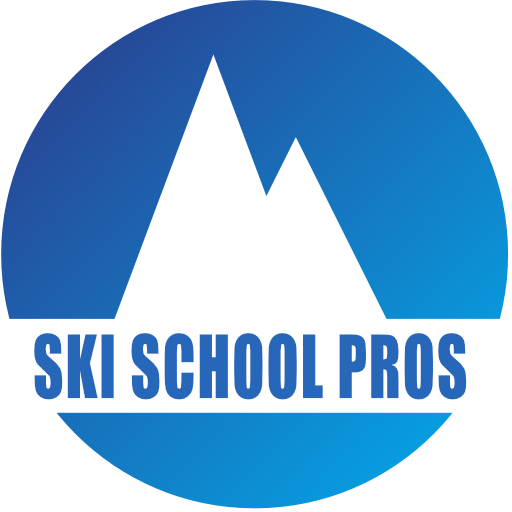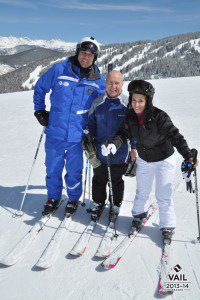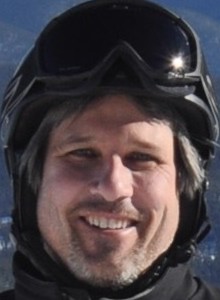To get the most enjoyment out of your snow sports experience (and many others), it helps to know what will make you happy and plan accordingly.
If your goal is to improve your technique or be able to safely explore parts of the mountain you have never been to before, then try to:
- Find the right instructor,
- Be prepared for the experience,
- Communicate with your coach,
- Have a good attitude, and
- Record important information.
- Staying up late,
- Drinking lots of good red wine and
- Doing shots with the bartender’s sisters immediately after arriving from sea level.
- Are they experienced & certified?
Click here to learn more
- How many years instructing total and at the resort where you want to take a lesson?
- What Certification level? In the United States, most certification is done by the Professional Ski Instructors of America-American Association of Snowboard Instructors (PSIA-AASI) and consists of 3 levels:
- Level 1 (Bronze Pin): Certified to teach in the beginner zone
- Level 2 (Silver Pin): Certified to teach through the intermediate zone
- Level 3 (Gold Pin): Fully Certified to teach through the advanced zone
- Experience with or Specialty Certifications for your situation?
- Children’s Specialist
- Adaptive
- Freestyle (Park & Pipe)
- Telemark
- Nordic
- Do they have positive client reviews?
- Can you relate and communicate well with each other?
- What language(s) do they speak?
- Is gender or age important to you?
- Are they available when and where you want them?
With many outdoor sports on offer and its close proximity to Denver and the Front Range, Summit County is know as Colorado's Playground. Nearby Ski Areas include:
- Arapahoe Basin- the Legend is now part of the Ikon Pass. Winner of the 2022 Golden Eagle Award from the National Ski Areas Association for the many ways they tackle environmental work.
- Beaver Creek- Over Vail Pass in nearby Eagle County, you won't be roughing it at this Epic Pass resort that features free chocolate chip cookies at the end of the day.
- Breckenridge- part of Vail Resort's Epic Pass with some of the steepest terrain in Summit complementing lots of long flat terrain for beginners.
- Copper Mountain- A nice mix of terrain at this Ikon resort. Home of early season race training and Woodward terrain parks (indoor and outdoor).
- Frisco Adventure Park- perfect for tubing and beginner skiers with low cost, lite crowds, and easy parking. Rentals and Group & Private Lessons from Snow Schoolers.
- Keystone- Whole family fun as part of Vail Resort's Epic Pass.
- Loveland- Located on the Denver side of the Eisenhower Tunnel, they offer reasonable prices for local families.
- Ski Cooper- Nice old school beginner and intermediate skiing and riding without epic prices in nearby Lake County.
- Vail Mountain- Operated by Vail Resorts via a Special Use Permit from the US Forest Service, their Epic Pass includes Beaver Creek, Breckenridge, Crested Butte, and Keystone.
Start by Selecting WHEN you are coming (by clicking on your 1st lesson date).
Be Prepared
This may seem obvious, but it is not uncommon for students to show up late, tired, hungry, thirsty, or with improper clothing/equipment. While you may be on vacation, the following will help
Have a good attitude
Some people are very “coachable” while others fight the learning process. Willingness to try new things and being patient will go a long way towards facilitating your improvement.
Communicate with your Instructor
Open communication lines with your instructor will make sure everyone is on the same page and facilitate reaching your goals.
Records: Notes, Photos, Videos & Charting Your Progress
Taking notes while on a ski vacation may not be what you want to do, but there are good reasons why instructors are required to take notes about their own skiing during the certification process.
It’s a cliché, but pictures are worth a thousand words and help bring back memories of the good times you have enjoyed on the slopes. Those of us who get to slide around in the mountains are tremendously blessed and truly lucky. Don’t be shy about taking photos of that first green chair lift ride, blue bird powder day, black diamond bump run, off-piste experience or of you smiling with your favorite instructor.
Click here to learn more
- Well Rested
- Acclimatized
- Hydrated/Nourished
- Drink more water than normal at elevation
- Have a nutritious breakfast that includes carbs and protein 1-2 hours before the start of your lesson.
- Properly Dressed
- Wicking base layer (silk, wool or synthetic that is comfortable for you)
- Water-proof outer layer- should be able to comfortably zip up above chin on cold or windy days
- Ski socks
- Middle layers based on expected conditions
- Gator
- Warm mittens if it is cold, gloves ok if it is warmer (slightly large is better than too small)
- Proper Equipment
- Comfortable, snug fitting boots that are proper for your skill level
- Skis/board that is appropriate for your skill level, the current snow conditions, the terrain you hope to ski and the skills you want to work on.
- Goggles, ideally ones that fit well and don’t fog easily
- Proper fitting helmet recommended
- All clothing and gear should fit properly together so there is no exposed skin or air leaks on cold days
- Be in Good Physical Shape
- While, people of various fitness levels enjoy skiing and snowboarding, they are athletic sports
- Good balance skills, core strength and well conditioned legs will help you progress faster and enjoy longer days
- Show up on time or early
Click here to learn more
- Be willing to try
- Expect new things to feel awkward at first
- You may need to leave your comfort zone to improve
- Have patience with yourself
- people learn at different rates
- don’t become discouraged if you are not improving as quickly as you hoped; breakthroughs often happen suddenly after lots of trying.
- Have patience with the learning process
- good instructors often use progressions that start simple and easy before becoming more complex
- expect to be on easier terrain to learn and practice new skills
Click here to learn more
- Pre-Lesson/Start of Lesson Goal Setting
- Experience, terrain you like/want to ride & Current Skill Level
- Other Sports/Related Experiences
- Physical Condition
- What you like/don’t like
- Teaching methods/experiences that you liked or learned best from in the past (skiing and/or other experiences)
- Teaching methods/experiences that you didn’t like or learn from
- Realistic goals for the day, week and/or season.
- During Lesson
- What is making sense for you/what you don’t understand
- How what you are currently doing relates to your goal(s)
- What physically seems to work/not work
- Biological Needs (food, water, toilet, warmth & rest)
- Modifying plan/goals as needed
- Drills, practice & terrain you can do on your own
Click here to learn more
While some may understand everything they hear, many people are more apt to understand something better after they have put it into their own words. This process also gives your instructor a chance to verify that you have correctly understood what they have tried to communicate to you.
Writing something down helps you to remember it and makes it more likely that you will make a serious effort to do it. Having something in writing helps you to review before your next ski day/trip/season even if what you wrote down has slipped your memory.
Charting your progress can be fun and helps you to evaluate how much you have improved. Improvement is not always linear. While there may be times that you feel you have not improved as much as you hoped, being able to reference older notes and accomplishments may help reinforce that you have actually improved more than you thought.



This is very good and super comprehensive.
You must have put lots of time in this.
Vail resorts should put that on their site for anyone that wants to take a lesson…it’s a great primer for anyone that is looking to get a ski lesson.
Ciao
Excellent advice, Matt, and useful across the board – even in race training settings. Kudos!
Matt is a graceful, elegant skier, and a really good teacher.
As a potential customer (5 year old granddaughter), I think this is an excellent checklist. Thanks for all your effort, Matt!